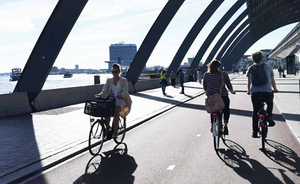Clear improvement in air quality in Europe over the last decade: fewer deaths related to pollution
Thanks to better air quality, around 60,000 fewer people died prematurely due to fine particulate matter pollution in 2018, compared with 2009. However, the European Environment Agency's (EEA) latest official data show that almost all Europeans still suffer from air pollution, leading to about 400,000 premature deaths across the continent.
“The EEA's data prove that investing in better air quality is an investment for better health and productivity for all Europeans. Policies and actions that are consistent with Europe's zero pollution ambition, lead to longer and healthier lives and more resilient societies,” said Hans Bruyninckx, EEA Executive Director.
The Air quality in Europe -2020 report provides an annual assessment of the status and impacts of air quality and recent air quality trends. The report shows that six Member States exceeded the European Union's limit value for fine particulate matter (PM2.5) in 2018: Bulgaria, Croatia, Czechia, Italy, Poland, and Romania. Only four countries in Europe — Estonia, Finland, Iceland and Ireland — had fine particulate matter concentrations that were below the World Health Organization's (WHO) stricter guideline values. The EEA report notes that there remains a gap between EU's legal air quality limits and WHO guidelines, an issue that the European Commission seeks to address with a revision of the EU standards under the Zero Pollution Action Plan.
“It is good news that air quality is improving thanks to the environmental and climate policies that we have been implementing. But we can't ignore the downside – the number of premature deaths in Europe due to air pollution is still far too high. With the European Green Deal we have set ourselves an ambition of reducing all kinds of pollution to zero. If we are to succeed and fully protect people's health and the environment, we need to cut air pollution further and align our air quality standards more closely with the recommendations of the World Health Organization. We will look at this in our upcoming Action Plan,” said Virginijus Sinkevičius, Commissioner for Environment, Oceans and Fisheries.
The EEA report also contains an overview of the links between the COVID-19 pandemic and air quality. A more detailed assessment of provisional EEA data for 2020 and supporting modelling by the Copernicus Atmospheric Monitoring Service (CAMS), confirms earlier assessments showing up to 60 % reductions of certain air pollutants in many European countries where lockdown measures were implemented in the spring of 2020. The EEA does not yet have estimates on the potential positive health impacts of the cleaner air during 2020.

